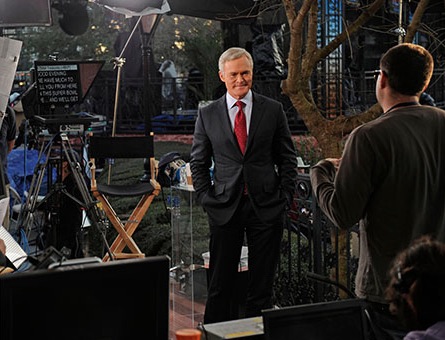‘30 Minutes’ Approach Has ‘Evening News’ Ticking Up

The smarter way to stay on top of broadcasting and cable industry. Sign up below
You are now subscribed
Your newsletter sign-up was successful
Related: Second Season Order Before Premiere? It’s TRU!
As was the case in Iowa last week, when NBC Nightly News anchor Lester Holt and ABC World News Tonight anchor David Muir delivered their evening programs from the scene of the caucuses, the anchors are in New Hampshire to report on the state’s primary. In both instances, CBS counterpart Scott Pelley opted to stay in New York, with a small army of network correspondents supplying boots on the Granite State ground.
According to Pelley, it’s not for a lack of interest in the political race. But the campaign noise that dominates the 24/7 news cycle often drowns out other worthwhile stories, he says, such as the growing threat of the Zika virus in Brazil. “If I move the evening news broadcast [to New Hampshire], it eats up a lot of money that really doesn’t pay off for us very much,” says Pelley. “I’d very much rather spend the money on big breaking news stories the audience cares about.”
CBS remains stuck in third place in evening news, and will remain there for the foreseeable future. But as Pelley approaches his five-year mark in the chair, an internal strategy to rebuild the network’s newscasts in the spirit of 60 Minutes is paying at least modest dividends. Season-to-date through January, Evening News is up 4%, to 7.58 million total viewers, with its 25-54 rating holding flat.
The 60 Minutes influence is evident in a harder news approach at Evening News than in the Katie Couric days. That includes impactful, longer-form pieces, such as a story CBS broke Jan. 26 on lavish spending within Wounded Warrior Project ranks, which had The NewYork Times and other outlets playing catch-up, and prompted an emergency board meeting for the veterans organization.
“We’re making room for these stories,” says Pelley. “These are not 1:30 stories. These are four and five minutes long; that’s huge for an evening news program.”
Pelley of course came from 60 Minutes in 2011, and continues to correspond for the program. His promotion at the time sent a message around TV newsrooms, according to Steve Capus, executive producer of Evening News. “That was a pretty profound statement CBS made,” he says. “It was a very strong indication that CBS was putting a 60 Minutes-type of thinking around evening news.”
The smarter way to stay on top of broadcasting and cable industry. Sign up below
Not Dead Yet
The evening news segment is in a curious place. Pelley, Holt and Muir are, in the words of one former TV news higher-up, “backup quarterbacks” when compared to the evening news leviathans of yore, which speaks to the decreased status of the form. “If [Peter] Jennings, [Dan] Rather and [Tom] Brokaw were around today,” says the news vet, who asked to go unnamed, “you’d put them in your morning show.”
Yet they also depict a next-generation anchor—no longer Voice of God, but an able steward who can deftly marshal correspondents to deliver the world in 30 minutes. While reports of evening newscasts’ demise have appeared for years, the sector is relatively healthy. Some $462 million in ad revenue was in play in 2014 (about half the morning news revenue total), according to Kantar Media. Evening news ratings were up 2% in ‘14, according to Pew Research Center, which has not released 2015 figures.
“There are still close to 25 million people a night who watch these programs,” says Andrew Heyward, former CBS News president. “It’s kind of amazing.”
Seven months after Holt was officially promoted at NBC, Nightly News continues to crush it. In the final week of January, Nightly News had 9.6 million total viewers (a 2.05 rating in 25-54), ahead of ABC’s 9.2 million (1.75) and CBS’ nearly 8 million (1.57). One news consultant describes Holt as “Steady Eddy”: “He’s not scintillating but he always conveys a good deal of gravitas.” (NBC and ABC did not make their evening news anchors or execs available to speak.)
‘Eye’ on the Ball
David Rhodes, CBS News president, is taking a similar tack with the evening broadcast as he has with CBS This Morning—practice hard-news principles every day, and exercise patience, and viewers will eventually come around. “We’re more likely to lead with Syria than the other guys,” he says of the evening broadcast. “That’s just a fact.”
Pelley uses a “brick-by-brick” analogy to describe the building going on at the CBS Broadcast Center at 6:30 p.m. The ratings say he’s in third, but he sees things otherwise. “This is the best evening broadcast when it comes to journalism, information, breaking news, investigative stories,” Pelley says. “We do not deserve to be in third place.”
Michael Malone is content director at B+C and Multichannel News. He joined B+C in 2005 and has covered network programming, including entertainment, news and sports on broadcast, cable and streaming; and local broadcast television, including writing the "Local News Close-Up" market profiles. He also hosted the podcasts "Busted Pilot" and "Series Business." His journalism has also appeared in The New York Times, The L.A. Times, The Boston Globe and New York magazine.

